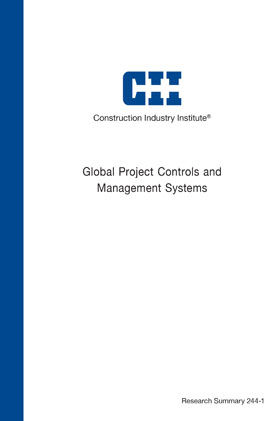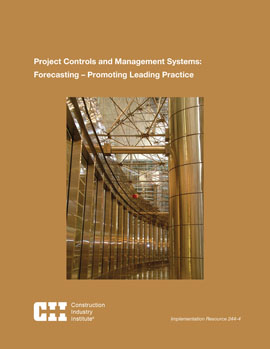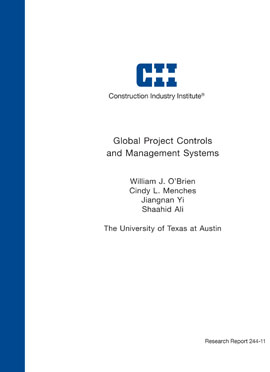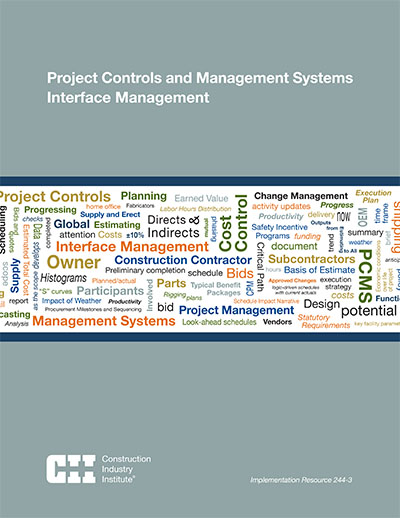
Global Project Control and Management Systems
Project Controls and Management Systems (PCMS) includes the people, processes and tools for the planning and execution of all phases of capital projects including, but not limited to, Estimating, Cost Control, Planning, Scheduling, Change Management, Progressing, and Forecasting. PCMS has received scant research in the last two decades and there is a popular impression that the principles of PCMS have changed due to many influences, including globalization and information technology. To update PCMS knowledge, the Construction Industry Institute (CII) chartered a research team of project controls experts. The research team reviewed modern PCMS practices, identified areas that need improvement, and provided recommendations and guidance for improving PCMS.
The research team concluded that the principles of PCMS functions that were established in the 1960s and 1970s are still valid today. However, the environment in which modern day construction projects operate has changed dramatically and PCMS needs to adapt accordingly. The drivers of the changing environment are captured in 13 trends:
- Sophistication of information technology
- Project complexity
- Speed of project execution
- Recognition of changes
- Changing owner organization direct involvement
- Globalization
- Outsourcing
- Graying of PCMS
- Contractor specialization
- Increase in regulatory oversight
- Distribution of project risks among and within organizations
- Virtual performers on project teams
- Labor and materials availability and price elasticity
The research team provided recommendations regarding how to adapt PCMS to the modern project environment, as well as how to improve interface management, forecasting, and PCMS learning and development. These recommendations are presented in four separate Implementation Resources as well as a Research Report. This document summarizes the principal findings and provides an introduction to the Implementation Resources.
As implemented by CII member organizations, the functions of PCMS are defined as follows:
- Planning – The process devoted to clearly identifying, defining, and determining the execution means and methods necessary to achieve project goals and objectives before initiation of execution. Planning may involve work packaging.
- Change Management – The process of effectively identifying, evaluating, and making decisions on new or revised scope/execution methods and monitoring implementation, all in an expeditious and systematic fashion.
- Estimating – The art and science of predicting the cost, time, and resources to deliver a scope.
- Scheduling – The art and science that results in a time-phased plan of activities that indicates what is to be done, when, by whom, and with what resources. Work packaging is included in scheduling.
- Cost Control – The process to catalog and analyze budgeted and actual expenditures of activities for purposes of timely identification of cost trends, problems, and opportunities during the course of the project. Cost control is not cost accounting.
- Progressing – Determining the status of completion using a consistent method, which should include earned value.
- Forecasting – The process of continuously predicting the final outcome of cost, time, and resources required to complete a scope. (RS244-1, p. 5)
The principles of PCMS are still valid today, but have been influenced and improved by the following trends.
These trends do not change the principles of PCMS, but pose challenges to implementation. In general, these trends stress existing project controls systems and emphasize the need for greater initial planning as well as increased scope definition if project controls are to be effective on contemporary projects.
Different projects will be influenced by the trends in varying degrees.
- Sophistication of Information Technology – Information technology (IT) has become increasingly sophisticated. Among several positive benefits, IT now grants the ability to deal with massive amounts of information, speeds the entry and dissemination of PCMS data, and offers the opportunity for innovative discovery.
- Project Complexity – Project complexity has recently increased exponentially and has many dimensions: mega-projects, designs that approach the physical limits of materials and equipment, construction in remote locations, partnerships, data integration requirements, and various project delivery systems and contracting strategies.
- Speed of Project Execution – The demand for faster project execution speed has increased tremendously. Today’s projects rarely have sequential project phases.
- Recognition of Changes – Change management is one of the greatest challenges to PCMS. As organizations lower the barriers behind reporting changes, increased emphasis is placed on the performance of the PCMS change control system.
- Changing Owner-Organization Direct Involvement – Many industries have seen a shift in owner organization direct involvement. This started with a general downsizing of owner’s engineering, construction, and PCMS teams and a resulting shift of responsibilities to the contractor(s).
- Globalization – Globalization requires companies to learn how to work within an international setting, with people that have different cultures, skill sets, and language capabilities.
- Outsourcing – Specifically for PCMS, outsourcing can be thought of in several ways, including: 1) outsourcing of owner PCMS requirements to independent third parties, 2) contracting PCMS resources to supplement owner organizations, and 3) requiring the delivery organization (contractor) to deliver against defined project planning, estimating, scheduling, cost control, progress tracking, and reporting requirements.
- Graying of PCMS – This trend refers to the general change of the PCMS work force in terms of demography and skill sets.
- Contractor Specialization – As owners strive to pass more risks on to contractors, contractors are focusing on their core competencies and looking for ways to assign risks to others.
- Increase in Regulatory Oversight – The regulatory bodies, including environmental, safety, security, and financial agencies, are becoming greater presences on projects.
- Distribution of Project Risks Among and Within Organizations – Increase in project complexity, changing owner organization direct involvement, and globalization contributed to the rise of project-risk recognition and management.
- Virtual Performers on Project Teams – Technology developments enabled virtual communication and have led to virtual performers on project teams. Global projects and outsourcing practices require project personnel to collaborate electronically.
- Labor and Materials Availability and Price Elasticity – In recent years, labor and material availability issues and price elasticity often draw discussions and complaints. This trend is the result of multiple factors, including global material demand, disaster relief resource-pull, and immigration policy. (RS244-1, p. 8)



